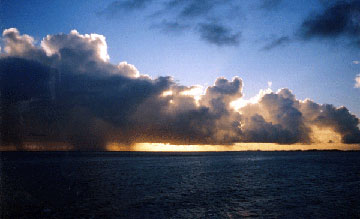Global carbon cycle is key to understanding climate change
Global carbon cycle is key to understanding climate change
mongabay.com
May 9, 2007
Despite its importance to mankind, the global carbon cycle is poorly understood. With concerns over climate change mounting, it becomes all the more imperative to understand how carbon is absorbed by the Earth’s oceans, vegetation, and atmosphere.
Now a new paper aims to demystify the carbon cycle, laying out what is known about the global carbon budget and why it is important to understanding climate change. Written by Dr. R. A. Houghton, a scientist at the Woods Hole Research Center and one of the world’s preeminent carbon cycle experts, the paper lays out the current understanding of the processes responsible for adding carbon (sources) to the atmosphere and for removing it (sinks).
“Figuring out where all the carbon emitted from burning fossil fuels ends up is surprisingly difficult, especially when one recognizes that there are only three places it can go: the atmosphere, the oceans and land (plants and soil),” said Houghton.

|
“The long-time effort to understand this distribution of carbon is giving way to a related question of whether and how the distribution of carbon will change as more carbon dioxide is added to that atmosphere and as the earth warms. The natural processes on land and in the ocean that have removed carbon dioxide from the atmosphere for the last century may be starting to weaken. The oceans are becoming more acidic, and we see more fires in both tropical and northern forests. If these natural sinks for carbon diminish, global warming will occur more rapidly than predicted, and efforts to manage it will become that much more difficult.”
The paper, titled “Balancing the Global Carbon Budget” (doi:10.1146/annurev.earth.35.031306.140057), is published in the current issue of the Annual Review of Earth and Planetary Science.
CITATION: R.A. Houghton (2007) Balancing the Global Carbon Budget. Annual Review of Earth and Planetary Sciences Vol. 35: 313-347 (Volume publication date May 2007)
(doi:10.1146/annurev.earth.35.031306.140057). First published online as a Review in Advance on January 16, 2007
ABSTRACT: The global carbon budget is, of course, balanced. The conservation of carbon and the first law of thermodynamics are intact. “Balancing the carbon budget” refers to the state of the science in evaluating the terms of the global carbon equation. The annual increases in the amount of carbon in the atmosphere, oceans, and land should balance the emissions of carbon from fossil fuels and deforestation. Balancing the carbon budget is not the real issue, however. The real issue is understanding the processes responsible for net sources and sinks of carbon. Such understanding should lead to more accurate predictions of future concentrations of CO2 and more accurate predictions of the rate and extent of climatic change. The recent past may be insufficient for prediction, however. Oceanic and terrestrial sinks that have lessened the rate of growth in atmospheric CO2 until now may diminish as feedbacks between the carbon cycle and climate become more prominent.














